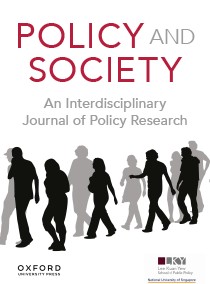传播专业知识:智库作为社交媒体时代的数字倡导者
IF 6.1
1区 社会学
Q1 POLITICAL SCIENCE
引用次数: 1
摘要
智库及其在提供政策咨询专业知识方面的作用一直是政策科学历史和正在进行的研究的主题。但是,在社交媒体时代,智库数字化行为的扩大趋势还有待调查。社交媒体在重塑政治生态、挑战传统知识来源的同时,也成为智库向公众和决策者公开分享专业知识和政策建议的潜在渠道,从而演变为“数字倡导者”。本文基于社交媒体大数据方法,构建了社交媒体账号的“网络中心性”和Facebook和Twitter社交媒体引用的“涟漪效应”两套新的智库指标,捕捉并观察了62个国家或地区的207家知名智库的数字化活动。我们的结论是,智库通过在线营销技能在社交媒体平台上传播专业知识,展示了他们的观点和价值观,并提高了作为数字倡导者的知名度。社交媒体拥有各种价值观和理念,不仅举办大规模的政策倡导活动,成为智库传播专业知识的舞台,而且正在改变智库产业和专业知识市场的生态。本文章由计算机程序翻译,如有差异,请以英文原文为准。
Spreading expertise: think tanks as digital advocators in the social media era
Abstract Think tanks and their roles in rendering expertise in policy advice have been the subject of historical and ongoing research in policy sciences. However, the widening trend of digital behaviors of think tanks in the social media era is yet to be investigated. While social media is reshaping the political ecology and challenging conventional sources of knowledge, it also serves as a potential channel for think tanks to publicly share their expertise and policy advice with the public and decision-makers, thus evolving into “digital advocators.” Based on social media big data methods, this paper has constructed two sets of new think tank indicators with “network centrality” of social media accounts and “ripple effect” of social media citations from Facebook and Twitter to capture and observe the digital activities of 207 prominent think tanks in 62 countries or regions. We have concluded that think tanks have displayed their opinion and values and increased visibility as digital advocators by spreading expertise on social media platforms with online marketing skills. With various values and ideas, social media not only is hosting massive policy advocacy activities and being an expertise spreading arena for think tanks but has also been changing the ecology of the think tank industry and expertise markets.
求助全文
通过发布文献求助,成功后即可免费获取论文全文。
去求助
来源期刊

Policy and Society
Multiple-
CiteScore
18.00
自引率
6.50%
发文量
43
审稿时长
30 weeks
期刊介绍:
Policy and Society is a prominent international open-access journal publishing peer-reviewed research on critical issues in policy theory and practice across local, national, and international levels. The journal seeks to comprehend the origin, functioning, and implications of policies within broader political, social, and economic contexts. It publishes themed issues regularly and, starting in 2023, will also feature non-themed individual submissions.
 求助内容:
求助内容: 应助结果提醒方式:
应助结果提醒方式:


